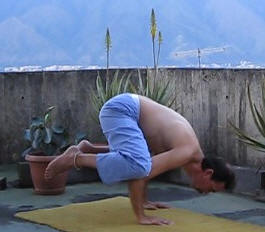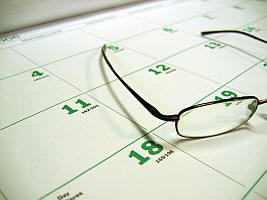Enchanted possibilities…
Lunar Letter / Desafía la Rutina
 Para bien o para mal nuestras rutinas crean nuestro destino. Frecuentemente, pensamos en la rutina como algo monótono e indeseado. Aún así, todos tenemos rutinas y no todas son malas.
Para bien o para mal nuestras rutinas crean nuestro destino. Frecuentemente, pensamos en la rutina como algo monótono e indeseado. Aún así, todos tenemos rutinas y no todas son malas.
Si bien hay ciertas rutinas y costumbres que quisiéramos cambiar, como fumar o comer demasiado, hay otras que nos permiten crecer y mejorar. Recientemente tuve la oportunidad de tomar unas largas vacaciones y me dí cuenta al regresar que había abandonado algunos excelentes hábitos de ejercicio. Retomarlos después de haberlos dejado por varias semanas ha sido un reto. Aunque sabía que debería establecerlos de nuevo por mi propio bien, no ha sido nada fácil.
 Se dice que toma aproximadamente 21 días para establecer un buen hábito y sólo 3 días para perderlo. Saber lo que debemos hacer es fácil, ¡hacerlo es otra cosa!
Se dice que toma aproximadamente 21 días para establecer un buen hábito y sólo 3 días para perderlo. Saber lo que debemos hacer es fácil, ¡hacerlo es otra cosa!
¿Cómo podemos cargarnos de energía y voluntad para establecer rutinas que nos den poder mientras eliminamos aquellas que no nos benefician? Aunque no pretendo tener la “respuesta definitiva,” hay algo que todos podemos hacer para encaminarnos hacia esta utopía. Cuando integramos un desafío como parte de la rutina, automáticamente este hábito se convierte en una actividad más placentera.
Esta idea es congruente con estudios realizados por Mihaly Csikszentmihalyi y Martin Seligman sobre la felicidad. Según los estudios de ambos, que incluyen investigaciones sobre cientos de miles de personas en todo el mundo de todas las edades y diversos estratos económicos y sociales, nos sentimos más felices cuando estamos encaminados hacia un objetivo. Aunque a todos nos encanta un descanso y echarnos en una playa sin tener nada que hacer es sabroso, por más extraño que parezca, ¡no son en estos momentos en los que estamos más felices!
Podemos desafiar la rutina para lograr más felicidad y fluidez en nuestras vidas. Decidir que vamos a realizar más ejercicio y comer mejor es una decisión que muchos hacemos con cierta frecuencia. Lamentablemente, muchas veces estos deseos se quedan en una idea nada más. El famoso, “Comenzaré el lunes,” se queda en el olvido de siempre.
 Una manera de cerrar esta brecha es establecer metas pequeñas que sean factibles y logrables Tomemos un ejemplo. Si alguien no ha hecho ejercicio durante el último año, ¿es realista que vaya a hacer ejercicio todos los días comenzando el próximo lunes? Aunque todo es posible, es probable que no se logre.
Una manera de cerrar esta brecha es establecer metas pequeñas que sean factibles y logrables Tomemos un ejemplo. Si alguien no ha hecho ejercicio durante el último año, ¿es realista que vaya a hacer ejercicio todos los días comenzando el próximo lunes? Aunque todo es posible, es probable que no se logre.
Si queremos hacer más ejercicio, podemos comenzar con cosas sencillas. Por ejemplo, subir las escaleras, aunque sea un par de pisos, en vez de tomar el ascensor. Levantar las cosas que tenemos que mover en vez de arrastrarlas por el piso. Comenzar el día con unos estiramientos antes de levantarnos de la cama en vez de simplemente pararnos en frío. En este caso el desafío puede ser, “¿Qué puedo hacer para hacer un poco de ejercicio en todo lo que hago en vez de ser tan flojo?”
Cuando establecemos objetivos pequeños que sean factibles, poco a poco vamos lejos. Los hábitos y rutinas que tenemos hoy son el producto de años de experiencia. No es realista pensar que podemos cambiar todos nuestros malos hábitos hoy y convertirlos en rutinas que nos darán poder mañana. Lo que sí podemos hacer es establecer pasos pequeños para desafiar la rutina y utilizar nuestra mente para nuestro beneficio en vez de nuestro perjuicio.
Todos sabemos lo que debemos hacer. No es el saber sino el hacer lo más importante. Cuando convertimos nuestras rutinas en un juego y buscamos una manera de hacerlas más interesantes logramos dos objetivos. El primero es entrar en un estado de fluidez que nos dirige hacia la felicidad y el segundo es establecer rutinas que nos llenan de poder y energía. Desafía la rutina hoy para lograr mucho más mañana.
∞ Rob McBride ∞
LL II 8
Lunar Letter / Challenge Routine
 For better or worse our routines direct our destiny. Frequently, we think about routine as something monotonous and undesirable. Even so, we all have routines and not all of them are bad.
For better or worse our routines direct our destiny. Frequently, we think about routine as something monotonous and undesirable. Even so, we all have routines and not all of them are bad.
While there are certain routines and habits we would like to change, like smoking and eating too much, there are others which drive us to grow and improve. Recently, I had the opportunity to take an extended vacation. When I returned, I realized I had stopped doing exercise. Even though I know these routines are most beneficial, after neglecting them for several weeks, reestablishing them has been a difficult task.
 There is a study which says it takes 21 days to establish a positive habit and only 3 days to lose it. While it may actually take more or less time, it’s a good rule of thumb. Knowing what we should do is easy; doing it is another story.
There is a study which says it takes 21 days to establish a positive habit and only 3 days to lose it. While it may actually take more or less time, it’s a good rule of thumb. Knowing what we should do is easy; doing it is another story.
How can we find energy and willpower to establish routines which will empower us while eliminating those which do not benefit us? While I don’t claim to have the “final answer,” there is something we can all do to lead us to this utopia. When we integrate challenge as a part of a routine, we automatically add an element allowing us to derive more pleasure from the activity.
This idea is congruent with the studies of Mihaly Csikszentmihalyi and Martin Seligman on happiness. Their studies include the investigation of hundreds of thousands of people worldwide, from all walks of life and diverse age groups. They conclude we are happiest when we are working towards a worthy ideal. Resting and basking on a beach with nothing to do has its value. As strange as it may seem, though, this is not when we are happiest.
We can challenge routine in order to achieve more happiness and “flow” in our lives. Deciding to exercise more and to eat less is a decision we make quite often. Unfortunately, these wonderful desires are often left as nothing more than good ideas. Inaction is the result of the famous line, “I’ll start on Monday.”
 One way to close this gap is to establish and achieve small realistic goals. Let’s look at an example. If someone hasn’t done any exercise in the past year, is it realistic they will start doing exercise every day starting next Monday? While anything is possible, it isn’t probable.
One way to close this gap is to establish and achieve small realistic goals. Let’s look at an example. If someone hasn’t done any exercise in the past year, is it realistic they will start doing exercise every day starting next Monday? While anything is possible, it isn’t probable.
If we want to start doing more exercise we can start with simple things. For example, we can start the day with some stretching before we get out of bed. We can take the stairs, even if it’s for a couple of floors, instead of taking the elevator. We can pick things up instead of dragging them across the floor. In this case the challenge could be, “What can I do to get a little bit of exercise in everything I do?”
When we establish achievable objective, little by little we go far. Our current habits and routines are the result of many years of experience. While it is not realistic to think we can change all of our bad habits and convert them into empowering routines tomorrow, taking small steps to challenge routine utilizes our mind to our benefit instead of to our detriment.
We all know what we should do. It isn’t what we know but rather what we do which is most important. When we make a game of our routines and look for a way to make them more interesting we achieve two objectives. First, we enter into a state of “flow” which leads us to happiness; secondly, we establish routines which create power and energy. Challenge routine today to achieve much more tomorrow.
∞ Rob McBride ∞
LL II 8
The Perfect Moment…
Crecimiento…
Success comes in cans not in cannots! (Joel Weldon)
Good Advice…
1 * Accept that some days you’re the pigeon, and some days you’re the statue
2 * Always keep your words soft and sweet, just in case you have to eat
them.
3 * Always read stuff that will make you look good if you die in the middle
of it.
4 * Drive carefully. It’s not only cars that can be recalled by their
Maker.
5 * If you can’t be kind, at least have the decency to be vague.
6 * If you lend someone $20 and never see that person again, it was probably
worth it.
7 * It may be that your sole purpose in life is simply to serve as a warning
to others.
8 * Never buy a car you can’t push.
9 * Never put both feet in your mouth at the same time, because then you
won’t have a leg to stand on.
10 * Nobody cares if you can’t dance well. Just get up and dance.
11 * Since it’s the early worm that gets eaten by the bird, sleep late.
12 * The second mouse gets the cheese.
13 * When everything’s coming your way, you’re in the wrong lane.
14 * Birthdays are good for you. The more you have, the longer you live.
15 * You may be only one person in the world, but you may also be the world
to one person.
16 * Some mistakes are too much fun to only make once.
17 * We could learn a lot from crayons. Some are sharp, some are pretty and
some are dull. Some have weird names and all are different colors, but they
all have to live in the same box.
18 * A truly happy person is one who can enjoy the scenery on a detour.
A lecturer, when explaining stress management to an audience, raised a glass
of water and asked, “How heavy is this glass of water?”
Answers called out ranged from 8oz. to 20oz.
The lecturer replied, “The absolute weight doesn’t matter. It depends on
how long you try to hold it.”
“If I hold it for a minute, that’s not a problem. If I hold it for an hour,
I’ll have an ache in my right arm.
If I hold it for a day, you’ll have to call an ambulance.”
“In each case it’s the same weight, but the longer I hold it, the heavier it
becomes.”
He continued, “And that’s the way it is with stress management. If we carry
our burdens all the time, sooner or later, as the burden becomes
increasingly heavy, we won’t be able to carry on.”
“As with the glass of water, you have to put it down for a while and rest
before holding it again. When we’re refreshed, we can carry on with the
burden. ”
“So, before you return home tonight, put the burden of work/life down.
Don’t carry it home. You can pick it up tomorrow.”
“Whatever burdens you’re carrying now, let them down for a moment if you
can. Relax; pick them up later after you’ve rested.
Life is short. Enjoy!”

